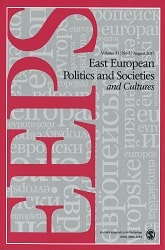“Why Can’t We Be Friends?” The Coalition Potential of Presidents in Semi-presidential Republics—Insights from Romania
“Why Can’t We Be Friends?” The Coalition Potential of Presidents in Semi-presidential Republics—Insights from Romania
Author(s): Veronica AnghelSubject(s): Political history, Government/Political systems, History and theory of political science, Transformation Period (1990 - 2010)
Published by: SAGE Publications Ltd
Keywords: political parties; coalition governments; semi-presidentialism; presidential power; Romania;
Summary/Abstract: Coalition governments are a regularly studied feature of parliamentary democracies. Debates still linger in the field as to what extent the outcomes of these studies are also applicable in determining who has the upper hand over coalition formation in semipresidential regimes. This article explores the dynamics of government formation under semi-presidential regimes using evidence from Romania (1990–2016) and discusses the formal and informal potential of the president to shape coalitions. It covers a lacuna in qualitative studies by using evidence gathered from in-depth interviews with prime ministers, cabinet members, and key party decision makers and shows that under certain circumstances presidents can play an influential role in government formation, but these are rather the exception than the rule. Using a case that presents the incentives for an increase in the presidentialization of politics, I show that the mechanisms of a multiparty regime mostly limit the president’s exclusive bargaining advantage to nominating the prime minister and then, much as in a parliamentary democracy, render him or her dependent on the coalition potential of his or her own party.
Journal: East European Politics and Societies
- Issue Year: 32/2018
- Issue No: 01
- Page Range: 101-118
- Page Count: 18
- Language: English
- Content File-PDF

